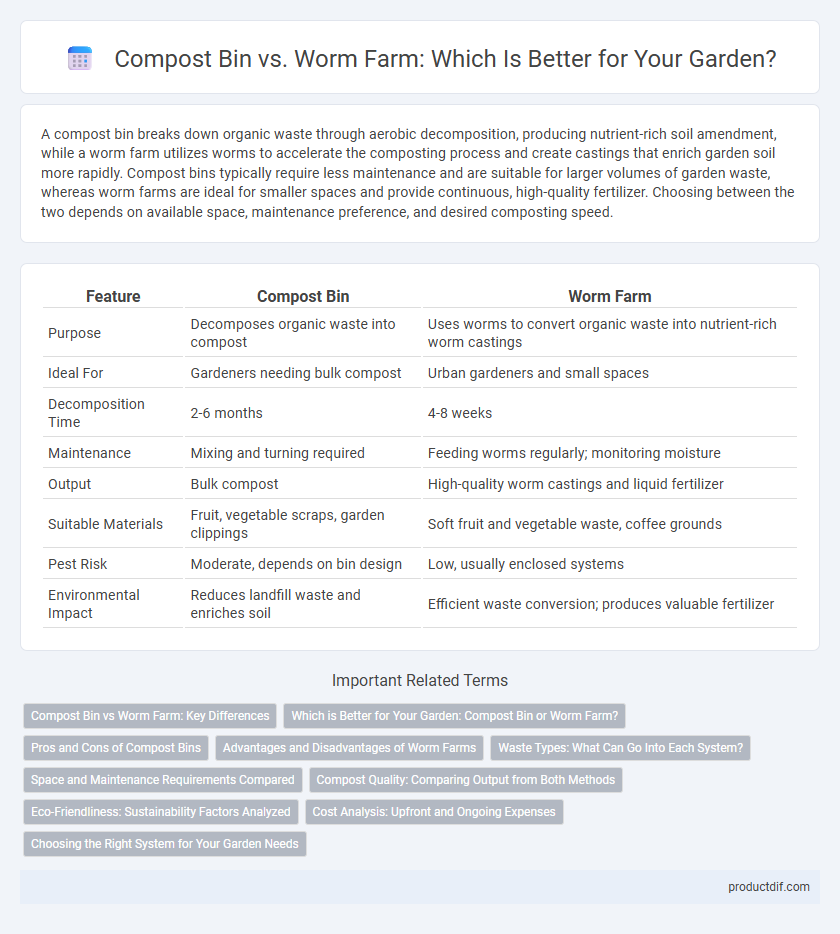A compost bin breaks down organic waste through aerobic decomposition, producing nutrient-rich soil amendment, while a worm farm utilizes worms to accelerate the composting process and create castings that enrich garden soil more rapidly. Compost bins typically require less maintenance and are suitable for larger volumes of garden waste, whereas worm farms are ideal for smaller spaces and provide continuous, high-quality fertilizer. Choosing between the two depends on available space, maintenance preference, and desired composting speed.
Table of Comparison
| Feature | Compost Bin | Worm Farm |
|---|---|---|
| Purpose | Decomposes organic waste into compost | Uses worms to convert organic waste into nutrient-rich worm castings |
| Ideal For | Gardeners needing bulk compost | Urban gardeners and small spaces |
| Decomposition Time | 2-6 months | 4-8 weeks |
| Maintenance | Mixing and turning required | Feeding worms regularly; monitoring moisture |
| Output | Bulk compost | High-quality worm castings and liquid fertilizer |
| Suitable Materials | Fruit, vegetable scraps, garden clippings | Soft fruit and vegetable waste, coffee grounds |
| Pest Risk | Moderate, depends on bin design | Low, usually enclosed systems |
| Environmental Impact | Reduces landfill waste and enriches soil | Efficient waste conversion; produces valuable fertilizer |
Compost Bin vs Worm Farm: Key Differences
A compost bin primarily decomposes a wide range of organic kitchen scraps and garden waste through microbial activity, producing nutrient-rich compost for soil amendment. Worm farms use specific species like red wigglers to efficiently convert kitchen waste into worm castings, a highly concentrated natural fertilizer. The key differences lie in processing speed, odor management, and the type of end product, with worm farms offering faster nutrient cycling and compost bins accommodating a broader variety of organic materials.
Which is Better for Your Garden: Compost Bin or Worm Farm?
A compost bin efficiently processes a wide range of organic waste, producing nutrient-rich humus that improves soil structure and supports plant growth. Worm farms excel at rapidly breaking down kitchen scraps into highly concentrated worm castings, enhancing microbial activity and nutrient availability. Choosing between them depends on garden size, waste type, and desired compost quality, with worm farms being ideal for small spaces and compost bins suitable for larger organic material volumes.
Pros and Cons of Compost Bins
Compost bins efficiently transform organic waste into nutrient-rich soil, promoting sustainable gardening and reducing landfill waste. They require minimal maintenance and can handle a wide range of materials, but may attract pests if not properly managed and can produce odors during anaerobic decomposition. While slower to produce finished compost compared to worm farms, compost bins offer greater capacity for bulk garden waste and are suitable for larger-scale composting needs.
Advantages and Disadvantages of Worm Farms
Worm farms efficiently convert organic kitchen scraps into nutrient-rich vermicompost, enhancing soil fertility and promoting sustainable gardening practices. They require less space and odor management compared to traditional compost bins but need careful monitoring of moisture, temperature, and pH levels to maintain healthy worm populations. Worm farms may not process large quantities of bulkier yard waste effectively, limiting their use for extensive garden debris.
Waste Types: What Can Go Into Each System?
A compost bin accepts a wide range of organic waste such as fruit and vegetable scraps, coffee grounds, grass clippings, and dry leaves, making it versatile for most kitchen and garden waste. Worm farms specifically require nitrogen-rich scraps like fruit peels, vegetable waste, and coffee grounds but exclude meat, dairy, and oils, which can harm the worms and generate odors. Understanding these waste type restrictions ensures optimal decomposition and nutrient-rich output in both systems.
Space and Maintenance Requirements Compared
Compost bins typically require more space, making them suitable for larger gardens or outdoor areas, whereas worm farms are compact and ideal for small spaces like balconies or patios. Maintenance for compost bins involves regular turning and monitoring moisture levels to speed up decomposition, while worm farms need careful feeding and moisture control to keep worms healthy and productive. Choosing between the two depends on available space and the gardener's willingness to engage in hands-on upkeep.
Compost Quality: Comparing Output from Both Methods
Compost bins typically produce nutrient-rich, earthy compost suitable for general garden use, with a balanced mix of organic matter and microbial activity. Worm farms generate high-quality vermicompost, enhanced with beneficial microbes and enzymes that improve soil health and plant growth more effectively than traditional compost. The presence of worm castings in vermicompost results in superior nutrient availability and faster decomposition, making worm farms ideal for gardeners seeking premium compost output.
Eco-Friendliness: Sustainability Factors Analyzed
Compost bins and worm farms both promote eco-friendliness by recycling organic waste into nutrient-rich soil amendments, reducing landfill burden and greenhouse gas emissions. Worm farms excel in sustainability through faster decomposition and nutrient retention, facilitated by the digestive processes of worms, which also produce valuable worm castings as natural fertilizer. Compost bins, while slower in breakdown, accommodate a wider range of organic materials and require less maintenance, making them a versatile option for sustainable garden waste management.
Cost Analysis: Upfront and Ongoing Expenses
Compost bins typically have lower upfront costs, ranging from $30 to $100, with minimal ongoing expenses, mainly occasional maintenance and turning. Worm farms require a higher initial investment of $50 to $150 due to specialized containers and starter worms but may incur slightly higher ongoing costs for worm food and moisture control. Long-term, worm farms can yield nutrient-rich vermicompost faster, potentially reducing the need for additional fertilizers and offsetting some expenses.
Choosing the Right System for Your Garden Needs
Selecting between a compost bin and a worm farm depends on garden size, waste type, and desired nutrient output. Compost bins efficiently handle larger volumes of diverse organic waste, producing rich humus ideal for soil amendment. Worm farms excel in smaller spaces, rapidly converting food scraps into nutrient-dense vermicompost, enhancing plant growth and soil vitality.
Compost Bin vs Worm Farm Infographic

 productdif.com
productdif.com